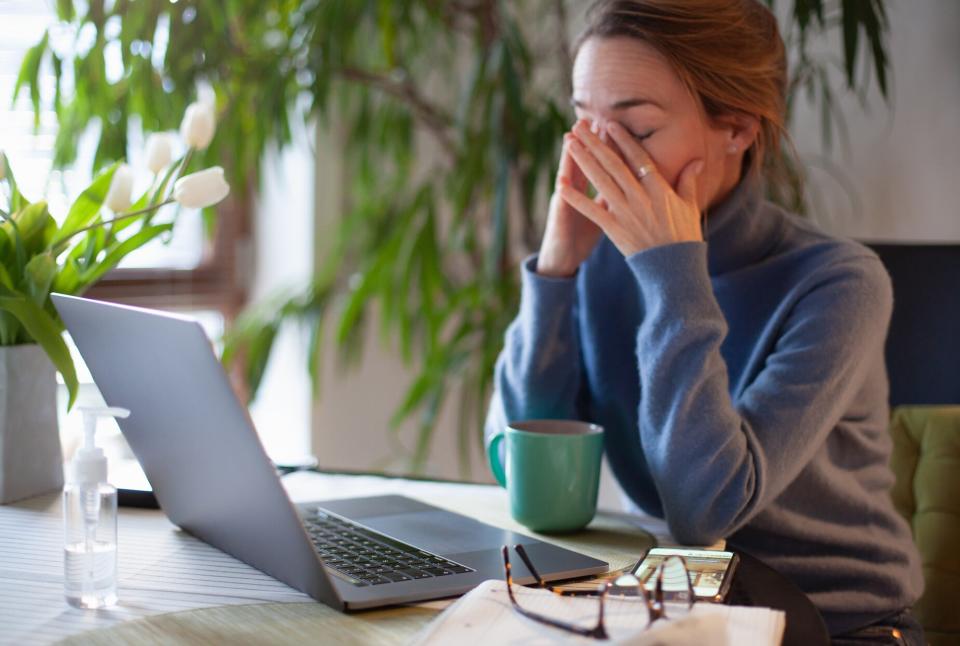Are Your Eyes Constantly Dry? These Remedies, Courtesy of an Optometrist, Will Help

As you're reading this, take a moment to evaluate your eyes. How do they feel? Better or worse than before the onset of the pandemic? If your immediate thought is that they're feeling worse, know that you're not alone. "Right now, due to an era of Zoom fatigue, millions of us are looking at screens more than ever," says optometrist Dr. Dhruvin Patel. "We usually blink 10 to 15 times in a minute, but when using screens, this decreases to about five times."

Getty / Kathrin Ziegler
Hence, dry eyes. "The blink plays an important role in supporting the tear film and making sure your tears do not evaporate," Dr. Patel adds. "Combining this with visual stress—this can be attributed to blue light, which sends your visual system [into overdrive]—your eyes are working extremely hard just to look at a screen." While excessive screen time is a major culprit in the dry eye equation, other factors may also play a role. To help you rule out other root causes of your visual discomfort, we chatted with Dr. Patel and board-certified ophthalmologist Dr. Michele Andrews, who share their best tips for combatting dry eyes below.
The Root Cause
While it's obvious that moisture levels determine how dry (or not) your eyes are, what's not so obvious are the factors behind those moisture levels. According to Dr. Andrews, aging, certain medical conditions, allergies, and various medications all play a part. Dr. Patel agrees, adding that the reason why all of the above can impact ocular hydration is due to a disturbance in the tear film. "The mechanism that causes dry eyes comes down to the disruption of your tear film, which sits on the front of your eye," he explains. "It is made up of three layers: fatty oils, aqueous fluid, and mucus. All three are needed for sufficient lubrication of the eye, and for smooth blinks and clear vision. Disturbance in any of these layers causes dry eyes."
While you might think that medical-related conditions are the only things that can influence dry eyes, Dr. Patel clarifies that environmental stimuli can, as well—and we don't just mean the weather. Artificial heating and cooling, rubbing your eyes incessantly, and, of course, excessive screen time can all lead to dry eyes.
Remedies
First things first: Dry eyes cannot be remedied with water, Dr. Patel explains. "Do not put water in your eyes or wash your face often to help—water does not help with dry eyes!" he says, noting that this will only make matters worse. What will work, however, is to mitigate the aforementioned factors. This means taking frequent breaks from a laptop (look up every 20 minutes or so), using blue light filters, and limiting exposure to air conditioning or heating systems (or adding a humidifier into your space to make up for these moisture-sucking machines). Additionally, Dr. Andrews says that artificial tears—which can be purchased without a prescription—can also soothe dry eyes. Prescription eye drops and ointments are also available if these over-the-counter options don't cut it.
Doctor Knows Best
Though you may feel confident in your ability to pinpoint the source of your dry eyes, Dr. Patel says that it's best to speak to your doctor or optometrist on next steps before taking matters into your own hands. This is especially true if you wear contacts, and are concerned that your lenses are the cause of the discomfort—which is why, when chatting a professional, Dr. Andrews recommends discussing a lens switch. "Biofinity Energy contact lenses help keep your eyes comfortable by locking in moisture and helping you focus on close-up digital devices," she says.

